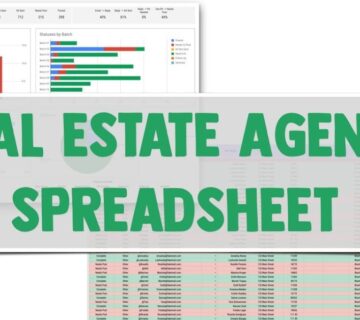If you are in the real estate business, you already know that managing clients, properties, and deals can sometimes feel like juggling too many balls at once. From capturing new leads to tracking conversations and closing sales, there is just so much happening at the same time. That’s exactly where a Real Estate CRM comes in.
A Real Estate CRM software is more than just a database. It is a complete system that helps agents and property managers stay on top of their work, improve customer relationships, and make smarter business decisions. But with so many options out there, how do you know which one is right for you?
In this blog, we’ll break down the top 7 Real Estate CRM features you should look for before making a decision. Whether you are a solo realtor or part of a large property firm, these features will help you stay organized and grow your business with confidence.
Lead Management and Tracking
Leads are the lifeblood of real estate. Without an effective way to capture and manage them, opportunities can slip away.
Easy Capture from Multiple Channels
A good CRM should allow you to bring in leads from websites, social media, or even offline campaigns. This ensures no opportunity gets missed.
Complete Lead Profiles
Details like contact info, property interest, communication history, and notes should all be stored in one place. This makes it easier for agents to follow up at the right time.
Stage-Based Tracking
From “interested” to “closing,” a strong CRM maps the entire sales journey. You’ll always know which stage each client is in, reducing confusion and lost deals.
Looking for a smarter way to manage leads? Property CRM offers stage-wise lead management so you can follow every client from first contact to closing.
Property Listing Management
If you handle multiple properties, things can quickly get overwhelming. That’s why property listing management is a must-have feature.
Centralized Property Database
Upload property details, floor layouts, images, and other materials in one place. This saves you time when sharing information with potential buyers.
Match Properties with Leads
The best CRMs use smart filters to match a client’s requirements with available listings. This makes your job much easier and increases the chance of a sale.
Marketing-Ready Assets
Having brochures, images, and layouts ready to share directly from your CRM makes client communication faster and more professional.
Sales Funnel and Workflow Automation
Time is money in real estate. Manual tasks can eat up hours of your day. That’s why automation is a game-changer.
Stage-by-Stage Funnel
From awareness to conversion, you can visually track every deal’s progress. It gives you a clear picture of where to focus your efforts.
Automatic Lead Assigning
CRMs with automation can assign new leads to the right sales agent instantly. This ensures faster follow-ups and reduces response times.
Notifications and Reminders
Automated reminders for calls, meetings, and emails keep agents on track without the stress of remembering everything manually.
Client Communication Tools
Real estate is a people-driven business. How you communicate often makes the difference between winning and losing a deal.
Multiple Channels in One Place
Whether it’s calls, emails, or even WhatsApp, a CRM should let you connect with clients using their preferred method.
Conversation History
Every interaction with a client should be recorded. This ensures that agents always have context, even if someone else picks up the conversation later.
Personalized Follow-Ups
Sending customized messages and reminders keeps clients engaged and shows them you care about their needs.
Business Analytics and Reporting
Making decisions without data is like driving blind. That’s why data-driven property insights are a must.
Manager and Employee Summaries
You should be able to see how each agent is performing, which properties are moving, and where deals are getting stuck.
Funnel and Deal Reports
Visual dashboards and reports help you understand your sales funnel at a glance. It shows which stages need improvement.
Forecasting and Planning
With insights into deal sizes, conversion rates, and timelines, you can make better decisions for the future.
Want detailed insights into your real estate performance? Try Property CRM’s built-in dashboards and reports powered by AI.
Mobility and Cloud Access
Real estate agents are always on the move, which makes mobility one of the most underrated yet important features.
Access Anywhere
A cloud-enabled CRM ensures you can log in from your laptop, phone, or tablet. No more being tied to the office.
Real-Time Updates
Agents can update lead status, add notes, or upload documents instantly. This keeps the entire team in sync.
Data Security
With cloud storage, your valuable customer and property data stays safe, even if a device gets lost.
Integration with Marketing and Website
Your CRM shouldn’t work in isolation. It should connect seamlessly with your other tools.
Website Lead Capture
Leads that come from your website should directly enter the CRM without manual entry. This reduces errors and speeds up response time.
Digital Marketing Sync
Integration with campaigns on Facebook, Google, and email ensures you track which sources bring the best leads.
Duplicate Management
A good CRM highlights duplicate entries to keep your database clean and efficient.
Conclusion
Choosing the best CRM for realtors isn’t just about picking the most popular tool. It’s about finding software that fits your workflow, helps you manage clients better, and grows with your business. The features we’ve discussed—lead management, property listings, sales funnels, communication tools, analytics, mobility, and integration—are the building blocks of any successful real estate operation.
If you are exploring real estate technology solutions, start by comparing these features. A well-chosen CRM doesn’t just organize your work, it transforms the way you sell.
Have questions or want to see how Property CRM works for your real estate business? Call us at +971 457 13703 or +92 300 1110365, or email us at info@propertycrm.net to get started today.”
Frequently Asked Questions:
What is a Real Estate CRM?
It is software designed to help real estate agents and companies manage leads, clients, properties, and deals more effectively.
Why do realtors need CRM software?
It helps agents track leads, automate workflows, improve communication, and close deals faster.
Which is the best CRM for realtors?
The best CRM depends on your needs, but look for features like lead tracking, property management, automation, and analytics.
How does CRM help in property sales tracking?
It gives you a clear view of where each client stands in the sales funnel, making it easier to prioritize follow-ups and close deals.
Can a CRM improve customer relationships?
Yes, by storing communication history and automating follow-ups, CRMs help agents build stronger, long-term relationships with clients.
Does a real estate CRM support marketing campaigns?
Many CRMs integrate with digital marketing platforms, making it easier to track campaign performance and ROI.
Is cloud-enabled CRM better for real estate?
Yes, cloud-based CRMs allow agents to access data on the go and keep teams updated in real time.
How much does a real estate CRM cost?
Pricing varies, but many providers offer free trials or demos before purchase. You can contact Property CRM directly for pricing.
 +971 457 13703
+971 457 13703






No comment